Author Archives: Children's Surgery International
Sunday – Time to plan, rest and explore
Wyn Huynh, CRNA ~ CSI Team Member
On most CSI trips, especially where teams travel a great distance, we try to build in time to rest and explore the local sights and culture. Today we did just that.
Through my experience of living in different cultures that speak different languages, I have learned that a little effort in learning to speak the local language, even a few words, and understand some of its culture and traditions will get you a long way.
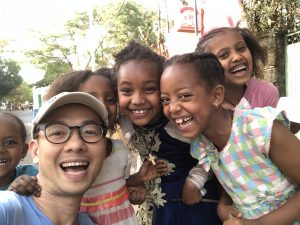
We know that in healthcare, trust is an important aspect between the provider and the patient. Could you imagine what it is like for these parents to hand their beloved child over to a foreigner like me – a nurse anesthetist, who speaks not a word of the local language, to put their child under anesthesia? I have found through my years of giving direct care to patients who do not speak my language, that if I can utter simple words of “hello,” “how are you” and “thank you” in their language, a whole world will open up and the trust relationship will soon be a reality.

On mission trips with CSI, team members occasionally have the opportunity to learn and immerse in the host country’s culture during the trip. Before our long surgery days in the week ahead, we had a chance to tour the city and visit a couple of monasteries, located on islands on beautiful Lake Tana. Lake Tana is a large body of water on the shores of Bahir Dar City – it is the origin of the famous Ethiopian river, the Blue Nile, and flows north over 900 miles, to join the White Nile at Khartoum in Sudan. Visiting the monasteries was so interesting – Faith is an extremely important part of Ethiopians’ lives. Nearly half the country is Christian Orthodox, mostly in the northern regions and about 40% are Muslims, mostly in the eastern, western and southern lowlands.
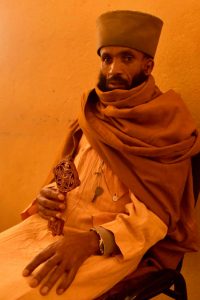
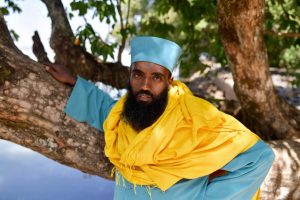
As of today, I was able to greet people in Amharic (one of the most widely used language in Ethiopia) and introduce myself – ready for the week. I feel good and a little closer to my Ethiopian people when I see their eyes perk up or giggle as I utter “selam”.
Screening Day – Ethiopia Spring 2018
Ellen Reynolds, CRNP ~ CSI Team Member
Families – parents and children. All over the world, there is a bond that surpasses culture and is visible to anyone who wants to see it. Today was our first glimpse into the bonds between Ethiopian parents and their kids.
There were parents and kids waiting for us today when we arrived at the hospital at 6:30 a.m. Some of them had traveled great distances and knew they were likely to be spending the next several days at the hospital, perhaps sleeping in a single bed with their child, or maybe sitting in a chair as their child recovered in a bed shared with another patient. They were proud of their children, often giving a big smile as we complimented their child on a pretty dress or a cute t- shirt. When they saw cameras come out, parents smiled and pointed to their child – “Take his picture!”. The parents as well as the kids delighted in seeing themselves – It was obvious that some had never before seen their own face in a photograph. The concern on their faces was evident when they were ushered into an exam room to see the surgeon, wondering if their child would be found healthy, strong, or big enough to go through the surgery they hoped would be life-changing.
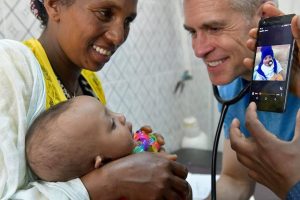
Our team’s goals for today were to identify those children who could safely undergo specialized surgery to correct facial abnormalities which often cause delayed growth or social humiliation, as well as those children with urologic problems that not only cause embarrassment, but also the real possibility of kidney disease. These parents are so hopeful! They are sensitive to their child’s fears and, at times – terror, regarding the strange white faces, examination, and use of everyday equipment such as stethoscope, thermometers, and blood pressure cuffs.
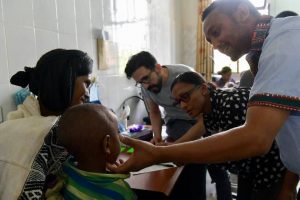
There were tears – From parents of the 6-week old baby too small to undergo complex urologic surgery, to the parents whose child was found to have significant signs of a heart disorder and would first and foremost need to see a cardiologist.
But there was a lot of joy. We screened more than 80 children and scheduled nearly 60 surgeries. We worked hard to show our respect for these families – to show we appreciated them and to share our confidence that their child would be on a path to a healthier and often happier life after this week’s surgery. There was play, with children chasing after bubbles and holding tightly to a squeaky duck toy or a plastic zebra. There was laughter and smiles. The hope was palpable. Parents and children. All over the world. We have more in common than not – it’s going to be a great week.
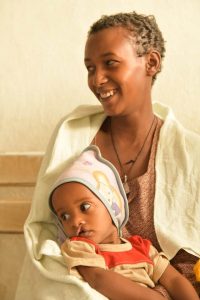
All together and ready to roll – Ethiopia spring 2018
Our team has safely arrived at Bahir Dar, Ethiopia! Team members hail from eight different states, but today, after nearly 25 hours of travel time and an overnight in the capital city of Addis Ababa, we are all together in Bahir Dar. Many team members are veteran CSI volunteers; eight volunteers are new to CSI. What a treat it is to welcome enthusiastic new volunteers.
Joined by our incredible partners at Taitu Tours, Bahir Dar University and Felege Hiwot hospital, it’s going to be an exciting week. This is the third CSI trip to Ethiopia, building on previous relationships with local professionals. Our team members will be working side-by-side with local surgeons and nurses, and our CSI nurse educator will be leading classes all week for local students and possibly families.
A few team members met with local hospital administrators and clinical supervisors today to discuss the details of the week, making certain that they can accommodate the patients we will be seeing and the care they will be receiving. We understand that our work may challenge their resources, as they are already extremely busy meeting the needs of their own patients. We are honored to be the guests of Bahir Dar University Hospital – Felege Hiwot. This teaching hospital is associated with the university and serves 5-7 million people in the Amhara region.
About 80 children have been identified by local surgeons as potential candidates for surgery. Tomorrow is screening day, when we will evaluate these children and determine which are ready for surgery this week. We are excited to be doing both ENT and urological surgeries. We also plan to deliver much-needed tools and equipment to our surgical and medical partners – items essential to performing these surgeries that are readily accessible in the U.S. but not in Ethiopia.
Sunday is a rest day and a chance to explore the beautiful city of Bahir Dar and some of its rich history, including the open-air markets, Lake Tana and more. This is an arid environment, located on Lake Tana at the headwaters of the Blue Nile River. The weather is lovely, sunny and about 85 degrees.
This week in Bahir Dar is all about transforming children’s lives and empowering local medical professionals through education and training. Life-changing surgeries will allow children to flourish in their communities, without the stigma that often accompanies birth abnormalities. Working closely with medical and surgical professionals will allow the work that has begun here to continue even after our team leaves.
Catherine ~ Liberia 2018
Thursday was the last full day of surgery on our Children’s Surgery International mission trip. Tomorrow we will pack up, have a celebration ceremony and start heading for home. It’s been a successful trip, with more than 100 surgeries, 11 seminars for local nurses and doctors, and lots of hands-on teaching by the surgical team.
Today has been a very special day for me. I had the opportunity to watch a cleft lip repair surgery on Catherine, an 8-year-old girl from rural Liberia. The pictures provide before and after pictures of Catherine as well as photographic proof that I was actually in the OR for the surgery! (I’m the one in the maroon scrubs as a non-medical volunteer on the trip, working with medical records.)
The pictures are dramatic, but there’s way more to the story. You might notice in the after photo that Catherine was eating applesauce and was being a bit messy after surgery. She had never been able to use her upper lip to get food off of her spoon, and she was learning how everything works with her new, intact lip. Her ability to eat and talk will improve significantly as she heals.
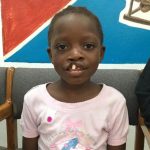
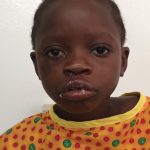
After surgery, I went to the family waiting room with Anna Koppel, RN, to bring Catherine’s aunt to the recovery room. When we called Catherine’s name, her aunt jumped up and practically danced to the door. As we made our way back to recovery, she exclaimed that Catherine would now be able to attend school. She related that when Catherine was with other kids in her village, they would stand in a circle around her and simply stare.
Catherine’s aunt had heard that CSI was coming to Liberia and was determined to give Catherine this chance at a better life. She rode her scooter an hour into the bush to get Catherine and then another four hours to Firestone Duside Hospital.
I’ll end by acknowledging with thanks the work that CSI does to make such miracles happen, and for the gifts of people like Dr. Brianne Roby, Catherine’s surgeon.
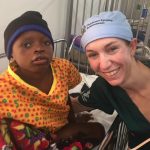
Sincerely, Mike Tveite, CSI medical records volunteer
See more photos from our trip here.
CSI and Liberia
Children’s Surgery International and Liberia – these two things fit together so beautifully. My name is Janet Darden. My husband, Don, is Director of Administrative Operations at Firestone Natural Rubber in Liberia. This is my second year to be a part of the CSI mission.
I’m not planning to write about the Liberian children this year, although their stories are incredibly moving. Instead, let me tell you what I have witnessed in watching the medical and support staff of the CSI Liberia 2018 team.
I see the doctor and nurse who make room for one more surgery in an already overwhelmingly busy OR schedule, often after kneeling in the rocks, outside in the heat, just to listen to a mother describe her child’s health problem.
That same doctor or nurse may lecture and teach for two hours, skipping lunch, just to train their Liberian colleagues. I choke up each time an OR nurse tenderly carries a young patient to the PACU, where he or she is met by the best of the best CSI pediatricians and nurses. And the medical records or logistics staff – well, what can I say? This mission would never happen without them.
Oh, and I love the happy place – the surgical ward – where children continue to heal. CSI and Firestone Medical Center staff dance together with the “soon to be discharged” patients as families sing their thank yous. AMAZING!
Children’s Surgery International, I tip my hat to you! It is my honor and privilege to be a part of this surgical mission and this team.
Enjoy photos from Liberia here.
Affectionately,
Janet Darden, The Sandwich Lady
Surgery Day 2 – Lots to do, much to learn ~ Liberia 2018
The hours are long – up before the sunrise and home long after sunset – but what a great day it was today at the hospital with everyone working together. We accomplished so much – working side by side our Liberian colleagues we completed 21 surgeries. The children and their families both in the recovery room and the pediatric ward are so grateful. They treated us to beautiful songs of thanks – Great, loud, joyous African voices. Today we also hosted 5 professional lectures. It is fun to listen to our Liberian nurse and doctor colleagues talk about the new skills they’ve gained and information they are learning and how it will help them serve their community long after the CSI team has gone.
The word is out that the CSI team is in country, so we also have many new patients arriving each day. Families who’ve traveled from near and far, pleading to come in to be screened, hoping for answers and a chance to receive life-changing surgery.
Our Liberian colleagues are not the only ones learning and growing this week. Tonight after dinner, the CSI team had a very special guest speaker, Sargent Caesar. Caesar works security for the Firestone Duside Hospital, but her passion is working with families. She spoke to us about domestic violence in Liberia and the roles parents play in this culture. She had us all sitting on the edge of our seats for 90 minutes!
Firestone continues to provide amazing support to make this trip such a huge success – everything from housing to meals and transportation and security – the team here makes us feel like we are coming “home” after a long and fulfilling day of work.
See more photos from today here.
Patient Screening/Evaluation Day – Liberia 2018
The entire CSI 2018 Liberia team has arrived, and today we were up well before the sun and the settling of the dew. After a hearty breakfast at the Guesthouse, we headed for the hospital for our patient-screening day. Our usual route has changed due to the collapse of the bridge over the Du River in June. It now takes about 40 minutes to get to and from the hospital on a very bumpy road.
We evaluated 105 patients, some of whom had been waiting for two days. We are able to treat a fairly wide range of surgical problems, thanks to the variety of specialties our surgeons represent: Dr. Vandersteen and Dr. Fox (urology), Dr. Andrews (general surgery) and Dr. Roby (ENT). Pediatricians Dr. Wood and Dr. Hennum, along with our nursing staff, worked together to make sure the kids are healthy enough for surgery. Our schedule for the week was quickly filled with 89 children.
An orphanage caregiver arrived with three young children after traveling 80 km, hoping for life-changing surgeries. One of the boys had been just recently taken into the orphanage and has no family. We are hopeful to offer surgery to two of these children. They really looked out for each other today during screening, referring to each other as brother and sister.
While patients were being screened, the pediatric ward, pre-op and recovery rooms were readied and the anesthesia and OR staff unpacked and prepared supplies for our first surgical day tomorrow. Our teams don’t want to put any unnecessary stress of the limited resources of the hospital, so we bring nearly all of our own supplies. Getting set up for a large number of surgeries in a few short days is a big job!
Tomorrow will be a busy and exciting surgery day.
See more photos from screening day here.
Another day in the community ~
We were up early again and off to three community centers to continue our deworming initiative. We treated more than 2,500 children today, working alongside local community leaders and teachers. The children’s teachers were so happy for the care, because the children have no access to health care and many of them have chronic problems with vomiting and diarrhea that keep them from their studies. By giving them this simple and relatively inexpensive oral medication, their chances of improved nutrition, growth and school performance are significantly improved.
To finish off the day, we stopped by Firestone Duside Hospital to check on our equipment and supplies. Everything has arrived safely from the United States, including the 17 bikes that pediatrician Tim Woods’ friends and neighbors donated in Minnesota!
Many families have already started to arrive in and around the hospital. Many travel long distances to see us and arrive well in advance in hopes of gaining access to care. Fortunately, Firestone provides a place for them to sleep while they wait for screening/evaluation day on Sunday. Leon Randall, our biomedical expert, has all the equipment tuned up and ready for surgeries to start on Monday.
We are looking forward to the rest of the CSI team to arrive tonight. Tomorrow the U.S. and German ambassadors to Liberia are coming to meet us for lunch. This is a great opportunity for the ambassadors to see what Firestone does for children in their country and the plans CSI has for life-changing surgeries this week.
These two days have been hard but rewarding work. We would like to express a huge thank you to all the donors at CSI for their support so we can provide care to children in this impoverished community.
See more photos from our busy day here.
Community health initiative ~ Liberia 2018
The first group of the CSI Liberia 2018 surgical team (Lora Koppel, Anna Koppel, Mike Tveite, Mary Johnson, Laura Michaud, Louann Randall and Dody Barr) arrived at the Firestone Guesthouse in Harbel at 1 a.m. Thursday. Our Firestone hosts Don and Janet Darden stayed awake to greet us, and after a light meal we were ready for some rest.
The following morning we were off with our Firestone co-workers to visit four schools identified as high need. Intestinal parasites are a significant public health problem in developing countries, including Liberia. This affliction can affect a large percentage of children and causes significant problems such as malnutrition, poor growth and even learning difficulties. We distributed deworming pills to about 1,500 children, and everyone who received the medication got a sucker to help the medicine go down!
Schools are a great place for us to treat the children. By school I mean a one-room cement building with only a chalkboard and no books. Children come with a notebook and pencil and bring their own chair to school. The children sang to us, and only a few of the younger ones were afraid of us. Firestone’s Sargent Caesar is in charge of this outreach program, and she will talk to us later in the week about what the word “family” means to Liberians.
Back at the Firestone Guesthouse, we enjoyed a delicious home-cooked meal. We were joined by Ed Garcia, President and Managing Director of Firestone Liberia, who thanked us and welcomed us back to Liberia.
Tomorrow we will visit three more communities and expect to treat 1,500 more children for intestinal parasites. In addition to surgeries, it’s great for our small group to get out into the community, where we get a chance to see the children in their school neighborhoods.
The rest of the Liberia surgical team is en route to meet us here. The current screening list has 180 kids waiting for us to evaluate!
Check out our photos!
Article – Drs. Peter Melchert and Craig Bowron
Do yourself a favor: Leave the country and see how health care is abroad
Here’s some advice for your career in health care: Leave the country as soon as possible.
This has nothing to do with the president’s attempts to euthanize the Affordable Care Act. Or with EMRs, Medicare reimbursements, or the burnout surveys you get from your employer, who also sends emails aimed at getting you to work faster and more efficiently.
It’s none of that. You need to leave the country, just for a week or two, and provide medical care to someone who would have a hard time getting it without you. Go somewhere where the waiting room is a line at the clinic door: no 500-gallon aquariums, or tapestry-sized TVs dangling from the wall. You need to go somewhere where your patient took a 10-hour bus ride out of the Agrarian Age just to see if you can help them. You need to see how the other half lives, the much larger “half” of the world that doesn’t enjoy anything near our standard of living.
